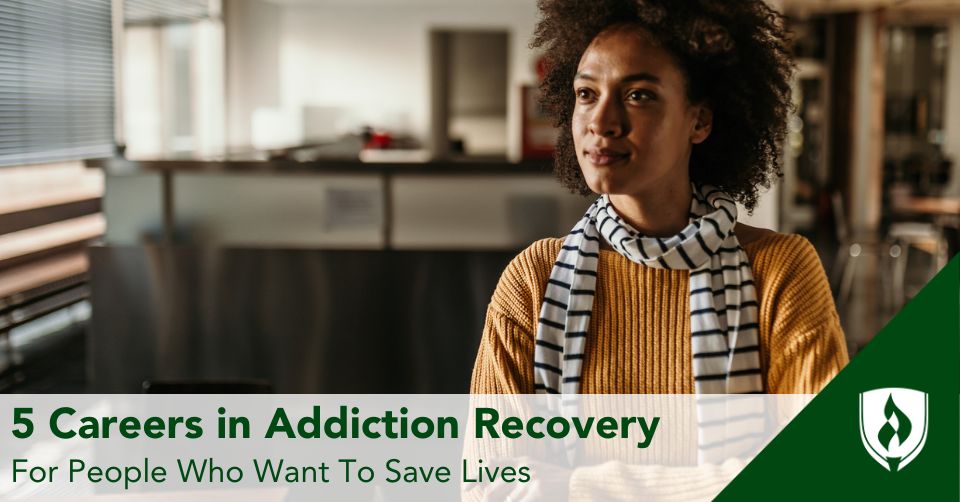
If you've ever dealt with an addiction or watched a loved one go through it, you know how unbelievably damaging it can be. When someone is struggling with drug abuse, alcoholism, behavioral addictions or more, getting back to healthy behavior normally takes support.
48.5 million people aged 12 or older had a substance use disorder in the past year, according to the 2023 National Survey on Drug Use and Health (NSDUH).1 You know what substance abuse and addiction does to people. You also know that recovery is possible.
The same survey shows that of the 30.5 million adults aged 18 or older who perceived ever having a substance use problem, 73.1% (or 22.2 million of them) considered themselves to be in recovery or to have recovered.1
If you're thinking about a career that can help people fight addiction, you're probably curious about some of the potential pathways. Here are five ways you can make helping people your full-time job.
1. Social Service Assistants
Social service assistants (sometimes called social service specialists) assist social workers, social organizations or addictions counselors, according to the BLS.2
Social service assistants can work for addiction organizations, harm reduction organizations, rehab facilities and more.
Job outlook
Employment of social and human service assistants is projected to grow 8 percent from 2023 to 2033, a rate faster than the average for all occupations, according to the BLS.3
The BLS writes that this projected rise in employment is due to more people seeking help with their substance abuse disorders instead of ending up in jail. As awareness about the damaging impacts of addiction spreads (along with more avenues to find healing and recovery) this trend will, hopefully, only continue.
Typical education
These roles can range from only requiring a high school diploma, to looking for some college experience, an associate's degree or a bachelor's degree. It really depends on the organization you work for and what they ask their social service assistants to handle.
Rasmussen University’s Human Services Associate’s degree and Human Services Bachelor’s degree programs are not designed to meet and do not meet the educational requirements for professional licensure as a therapist, counselor, social worker, psychologist, or other similar licensed careers in any state.
2. Health Education Specialists
Health education specialists teach people about behaviors that promote wellness. They develop strategies to improve the well-being of individuals and communities, and that can include promoting the prevention, awareness and treatment of substance use and addiction.4
These professionals develop programs, materials and events that teach people about various health topics and help connect people with services they may need. They may also advocate for different communities and populations. From healthcare facilities to nonprofits to public health departments, health education specialists can work in a range of different settings.
Job outlook
Employment of health education specialists is projected to grow 7% from 2023 to 2033, which is faster than the average for all occupations, according to the BLS.5
The demand for health education specialists is also expected to increase as governments, healthcare providers and social services providers look to find inexpensive ways to improve overall health outcomes.
Health education specialists can play an important role in teaching people about health and wellness, and ultimately preventing costly diseases and medical procedures—a number of which can be tied to substance use and addiction.
Typical education
Health education specialists typically need at least bachelor’s degree in health education, public health, health promotion or a related major in business or healthcare, according to the BLS. Some employers may also require or prefer that health education specialists be certified, or even hold a master’s or doctoral degree.
Rasmussen University’s Master of Public Health degree program is not designed to prepare graduates for any-state issued professional license or certification and has not been approved by any state professional licensing agency.
Relevant graduate degrees include areas of study like community health education, school health education, public health education or health promotion. Addiction and recovery majors might also be interested in this career path.
3. Community Health Workers
Community health workers help people adopt healthy behaviors to promote overall wellness, according to the BLS. They typically focus on helping those who may have limited access to health resources and social services. These professionals provide resources, implement programs and coordinate care for the individuals and communities they serve.6
Community health workers can provide support across a range of wellness needs, including recovery services for mental health and substance use disorders, and make a positive impact on the communities they care about.
For more on what they do, check out What Is a Community Health Worker? A Closer Look at This Rewarding Role.
Job outlook
Employment of community health workers is projected to grow 13% from 2023 to 2033, which is much faster than the average for all occupations.2
A continued need for community health workers is expected as organizations and government agencies work to provide people with the health-related information they need, and individuals diagnosed with chronic diseases, mental health issues and substance abuse disorders continue to need assistance finding resources and support.
Typical education
Community health workers typically need at least a high school diploma, though some employers prefer candidates with higher education. Most community health workers must also complete on-the-job training and some states require certification.8
4. Social and Community Service Managers
Social and community service managers coordinate and supervise programs and organizations that support public well-being, and they may even manage the community health workers mentioned above. These professionals can work for a variety of organizations, and can help particular demographics or people facing specific challenges—one being addiction and substance abuse.9
Social and community service managers oversee the administrative aspects of these public programs and services, and they will also measure and demonstrate the efficacy of these programs to potential or existing funders. This is a great pathway to consider if you'd like to help those in addiction recovery in a less hands-on, more high-level way.
Job outlook
Employment of social and community service managers is projected to grow 8% from 2023 to 2033, a rate faster than the average for all occupations.10
Part of this growth is projected to stem from people continuing to seek addiction treatment, as well as an increasing number of people with substance abuse disorders being referred to treatment programs rather than sent to jail. As a result, more social and community service managers who direct treatment and recovery programs will be needed.
Typical education
Social and community service managers typically need a bachelor's degree in social work or a related public policy or social services field, though some positions also require a master’s degree. Because this is a manager-level role, a certain amount of relevant work experience is also typically required.
Rasmussen University’s Human Services Associate’s degree and Human Services Bachelor’s degree programs are not designed to meet and do not meet the educational requirements for professional licensure as a therapist, counselor, social worker, psychologist, or other similar licensed careers in any state.
5. Substance Abuse Counselors (Also Called Addiction Counselors)
These careers are probably the first most people think of when they wonder about addiction recovery jobs. Addiction counseling is a vital part of recovery for most people in recovery.
Substance abuse counselors advise people on a range of issues, including those relating to alcoholism, addictions or depression, according to the U.S. Bureau of Labor Statistics (BLS).11 A substance abuse counselor may also be referred to as an addiction counselor, since they provide support to help clients prevent or recover from addiction, as well as modify problem behaviors or improve their mental health.
Day to day, counselors evaluate their clients’ health and addictions and assess their readiness for treatment. They develop and recommend treatment plans and assist clients in gaining the skills and behaviors necessary for recovery.
These professionals have powerful impacts, as addiction counseling can play a big role in helping individuals live happy, healthy lives in recovery.
Job outlook
Employment of substance abuse, behavioral disorder and mental health counselors is projected to grow 19% from 2023 to 2033, a rate much faster than the average for all occupations.12
Demand for these workers is expected to increase as the number of people facing mental illness in general, as well as behavioral disorders and opioid and other addictions continues to grow. It'll also increase as a growing number of jurisdictions require offenders with addictions to seek counseling as part of their sentences.8
Typical education
Education requirements vary for these roles depending on the specific position, state or employer. Counselors working in addiction recovery typically need at least a bachelor’s degree, though some positions require a high school diploma and others require a master’s degree.
Rasmussen University’s Human Services Associate’s degree and Human Services Bachelor’s degree programs are not designed to meet and do not meet the educational requirements for professional licensure as a therapist, counselor, social worker, psychologist, or other similar licensed careers in any state. It is important to check the education, certification/licensing, and/or work experience requirements that are required by employers and/or state professional licensing agencies to pursue a career opportunity as a Substance Abuse Counselor or Addictions Counselor.
People Need Your Help
Addictions make people believe they will never get free. Feeling helpless as you watch your addiction destroy your life is its own special brand of horror. Compassion and empathy are at the heat of a human services degree program.
If you have compassion for people inside that spiral of shame, fear and grief, these careers are a powerful way to help. You can quite literally save their lives.
If one of these careers jumped out at you, research it and get a good look at the requirements and options that come with it.
And check out "How to Become an Addictions Counselor or a Substance Abuse Support Specialist" to get a deeper look at one of the most direct ways you can work in addiction recovery.
Rasmussen University’s Human Services Associate’s degree and Human Services Bachelor’s degree programs are not designed to meet and do not meet the educational requirements for professional licensure as a therapist, counselor, social worker, psychologist, or other similar licensed careers in any state. It is important to check the education, certification/licensing, and/or work experience requirements that are required by employers and/or state professional licensing agencies to pursue a career opportunity as a Substance Abuse Counselor or Addictions Counselor.
1SAMHSA, Highlights for the 2023 National Survey on Drug Use and Health, [Accessed October 2024] https://www.samhsa.gov/data/sites/default/files/NSDUH%202023%20Annual%20Release/2023-nsduh-main-highlights.pdf
2Bureau of Labor Statistics, U.S. Department of Labor, Occupational Outlook Handbook, Social and Human Services Assistants, [accessed 10/1/2024], Social and Human Service Assistants : Occupational Outlook Handbook: : U.S. Bureau of Labor Statistics (bls.gov)
3Bureau of Labor Statistics, Occupational Outlook Handbook, Social and Human Service Assistants, [accessed 10/1/2024], Social and Human Service Assistants : Occupational Outlook Handbook: : U.S. Bureau of Labor Statistics (bls.gov)
4Bureau of Labor Statistics, Occupational Outlook Handbook, Health Education Specialists, [accessed 10/1/2024], Health Education Specialists : Occupational Outlook Handbook: : U.S. Bureau of Labor Statistics (bls.gov)
5Bureau of Labor Statistics, Occupational Outlook Handbook, Health Education Specialists, [accessed 10/1/2024], Health Education Specialists : Occupational Outlook Handbook: : U.S. Bureau of Labor Statistics (bls.gov)
6Bureau of Labor Statistics, Occupational Outlook Handbook, Community Health Workers [accessed 10/1/2024], Community Health Workers : Occupational Outlook Handbook: : U.S. Bureau of Labor Statistics (bls.gov)
7Bureau of Labor Statistics, Occupational Outlook Handbook, Community Health Workers [accessed 10/1/2024], Community Health Workers : Occupational Outlook Handbook: : U.S. Bureau of Labor Statistics (bls.gov)
8Bureau of Labor Statistics, Occupational Outlook Handbook, Community Health Workers [accessed 10/1/2024], Community Health Workers : Occupational Outlook Handbook: : U.S. Bureau of Labor Statistics (bls.gov)
9Bureau of Labor Statistics, Occupational Outlook Handbook, Social and Community Service Managers [accessed 10/1/2024], Social and Community Service Managers : Occupational Outlook Handbook: : U.S. Bureau of Labor Statistics (bls.gov)
10Bureau of Labor Statistics, Occupational Outlook Handbook, Social and Community Service Managers [accessed 10/1/2024], Social and Community Service Managers : Occupational Outlook Handbook: : U.S. Bureau of Labor Statistics (bls.gov)
11Bureau of Labor Statistics, Occupational Outlook Handbook, Substance Abuse, Behavioral Disorder, and Mental Health Counselors [accessed 10/1/2024], Substance Abuse, Behavioral Disorder, and Mental Health Counselors : Occupational Outlook Handbook: : U.S. Bureau of Labor Statistics (bls.gov)
12Bureau of Labor Statistics, Occupational Outlook Handbook, Substance Abuse, Behavioral Disorder, and Mental Health Counselors [accessed 10/1/2024], Substance Abuse, Behavioral Disorder, and Mental Health Counselors : Occupational Outlook Handbook: : U.S. Bureau of Labor Statistics (bls.gov)




